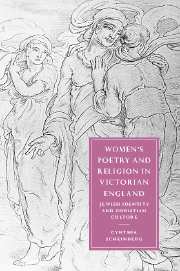Book contents
- Frontmatter
- Contents
- Acknowledgments
- 1 Introduction
- 2 “Sweet singers of Israel”: gendered and Jewish otherness in Victorian poetics
- 3 Elizabeth Barrett Browning and the “Hebraic monster”
- 4 Christina Rossetti and the Hebraic goblins of the Jewish Scriptures
- 5 “Judaism rightly reverenced”: Grace Aguilar's theological poetics
- 6 Amy Levy and the accents of minor(ity) poetry
- Notes
- Bibliography
- Index
- CAMBRIDGE STUDIES IN NINETEENTH-CENTURY LITERATURE AND CULTURE
3 - Elizabeth Barrett Browning and the “Hebraic monster”
Published online by Cambridge University Press: 22 September 2009
- Frontmatter
- Contents
- Acknowledgments
- 1 Introduction
- 2 “Sweet singers of Israel”: gendered and Jewish otherness in Victorian poetics
- 3 Elizabeth Barrett Browning and the “Hebraic monster”
- 4 Christina Rossetti and the Hebraic goblins of the Jewish Scriptures
- 5 “Judaism rightly reverenced”: Grace Aguilar's theological poetics
- 6 Amy Levy and the accents of minor(ity) poetry
- Notes
- Bibliography
- Index
- CAMBRIDGE STUDIES IN NINETEENTH-CENTURY LITERATURE AND CULTURE
Summary
“HEBREW ROOTS ENOUGH … TO FRIGHTEN”: THE DOUBLE EDGE OF HEBRAIC KNOWLEDGE
Although she [Miss Barrett] has read Plato, in the original, from beginning to end, and the Hebrew Bible from Genesis to Malachi (nor suffered her courset to be stopped by the Chaldean), yet there is probably not a single good romance of the most romantic kind in whose marvellous and impossible scenes she has not delighted … All of this, our readers may be assured, that we believe to as strictly authentic as the very existence of the lady in question, although, as we have already confessed, we have no absolute knowledge of this fact. But lest the reader should exclaim, “Then, after all, there really may be no such person!” we should bear witness to having been shown a letter of Miss Mitford's to friend, from which it was plainly to be inferred that she had actually seen and conversed with her.
(Richard Horne, A New Spirit of the Age, 339–40)So he has exalted me personally with all manner of devices … with the aid of “charming notes to fair friends”, – & Hebrew roots & Plato enough to frighten away friends fair and brown … the circumstance of your name being mentioned (as it is once) in connection with me, goes very far to reconcile me to my position as an Hebraic monster who lives in the dark. […]
- Type
- Chapter
- Information
- Women's Poetry and Religion in Victorian EnglandJewish Identity and Christian Culture, pp. 62 - 105Publisher: Cambridge University PressPrint publication year: 2002

